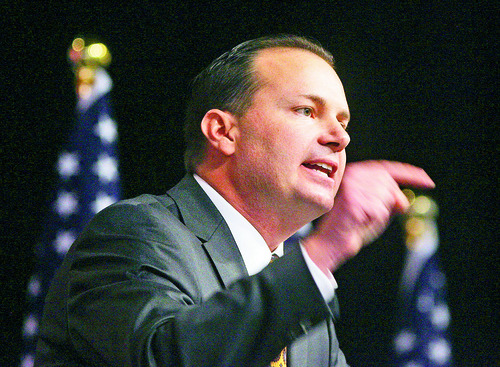This is an archived article that was published on sltrib.com in 2013, and information in the article may be outdated. It is provided only for personal research purposes and may not be reprinted.
Washington • Senators pressed intelligence officials on Wednesday on their need to harvest tens of millions of phone records from Americans, suggesting that such a massive data-collection effort would be better handled by asking phone companies for specific information on individual suspects.
"It seems to me what's being described as a very narrow program is really a broad program," Sen. Dick Durbin, D-Ill., said during a hearing on the National Security Agency's phone surveillance program.
"We've saved lives with this; good," Durbin continued. "That's what we want our government to do. Couldn't we also save the same number of lives, have the same impact if knowing my telephone number as a suspect, you could search my records instead of everyone's records in my area code."
NSA Deputy Director John Inglis said that it was possible to ask phone companies to store such data — if the government paid for that, he added — but Inglis later noted that it may not be practical for what the agency needs to do, which is conduct comprehensive queries.
"Breadth is important," Inglis said. "I think that we can take a look at whether this is stored at the provider, so long as you have some confidence you can do this in a timely way. We need to sometimes disrupt an operation that's in play, that's in progress. And so seconds, hours, matter."
The House last week narrowly rejected a measure that would have halted the NSA's bulk collection abilities in favor of phone companies retaining the data themselves. The NSA, under that plan, would have had to ask phone companies for individual data.
It is unclear how such a change would affect the NSA's new Utah Data Center, a massive storage facility set to come online this fall. The center is expected to be the world's largest data center and could hold some of the telephone "metadata" at the heart of the congressional debate and public angst over loss of privacy.
The center was not mentioned in Wednesday's hearing but the program to collect Americans' phone records, but not their content, was front and center.
One of the NSA's biggest supporters, Senate Intelligence Committee Chairwoman Diane Feinstein, D-Calif., defended the data collection by the agency as essential to thwart terrorist attacks — but she also signaled interest in changing the rules, including shortening the five years the NSA can hold the data.
"I support this program," Feinstein said. "I think based on what I know, [terrorists] will come after us. And I think we need to prevent an attack wherever we can from happening. That doesn't mean that we can't make some changes."
Sen. Mike Lee, R-Utah, is co-sponsoring a bill with Senate Judiciary Chairman Patrick Leahy, D-Vt., that would narrow the NSA's ability to collect phone data to only records relevant to an ongoing investigation that has a foreign link.
Lee, said there seems to be a disconnect in what the NSA is saying about its programs and the way the programs work and Americans are confused.
"What would you say to my constituents who say, 'I don't want the government having that information. It's not the government's information?' " Lee said.
Deputy Attorney General James Cole said the Foreign Intelligence Surveillance Court has approved the program 34 times and added that there are multiple restrictions on how that data can be accessed and used.
"It's worth having a debate about where we're going to strike that balance between security for the nation and making sure that people's privacy and civil liberty rights are being honored," Cole said. "And that's a tough balance to find, but it's a balance worth talking about."
Leahy noted that the government could strip-search everyone entering a building, close off the borders, wiretap all cellphones and search every home in the name of security but that wouldn't be the right answer to facing a threat.
"There are certain things, certain areas of our own privacy that we Americans expect," Leahy said. "And, at some point, you have to know where the balance is."



